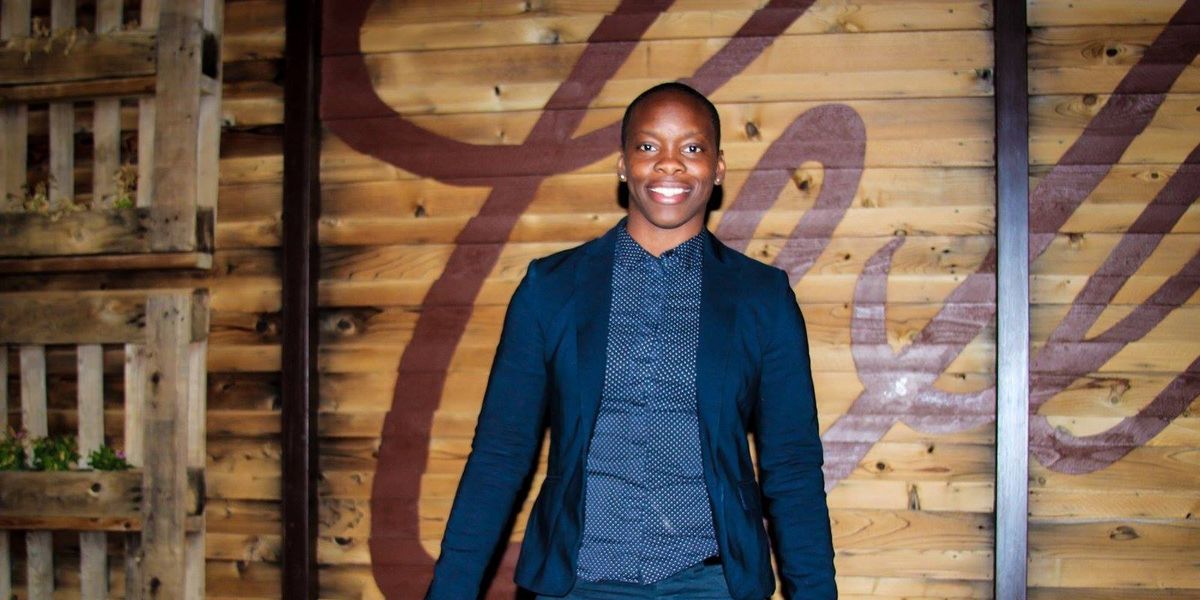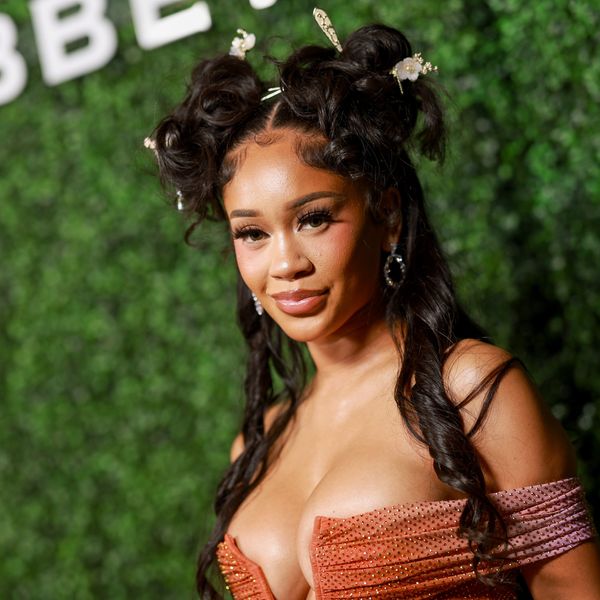
Here’s How This Entrepreneur Is Breaking Up The Boys' Club In Sports
During the 2024 Emmy Awards, Niecy Nash delivered an inspiring acceptance speech that left the audience in awe. She declared the best investment one can make is in themselves, leading to the greatest decision she ever made. This statement resonates with many of us as we strive to achieve our goals and dreams. As a Black woman in Hollywood or corporate America, navigating the workplace can be overwhelming. Like any journey, there are ebbs and flows. However, it's important to remember that you are not alone.
Women in the workplace face unique challenges that can make it difficult to lead in their most authentic way. Fortunately, there are individuals like Odessa "OJ" Jenkins, the CEO of Bonfire Women, who are taking on the challenge of cultivating a more inclusive, supportive, and winning workplace culture.
As a trailblazer for women in football and the founder of The Women's Football Club, OJ is a Hall of Famer, a 7x National Champion, a 2x USA Football Team captain, and a 3x Team USA Gold Medalist. The football champion spoke with xoNecoleto provide critical tools and insights for both aspiring leaders and experienced professionals. She emphasizes the importance of being paid your worth and establishing best practices to receive proper recognition, especially in the face of adversity.
Because remember, it's your season to win!
xoNecole: What three lessons would you impart to women who strive to redefine success in the workplace so it won't crush their souls?
Odessa Jenkins: First, remind yourself that success is within you, not something that gets defined for you. Once you can answer the question, 'What do I want?' defining success becomes easier. It's not what the world wants for you, but what do you want?
Secondly, lose fear and ask for what you need and want. I think the idea for many women is that we are afraid. We limit ourselves because we haven't achieved or don't see ourselves in certain positions. We're afraid to be the first. We're afraid to make mistakes. Just lose all fear and ask for what you need and want.
Lastly, to realize the power of a woman. Realize that you have, as a result of being a woman in the world, experienced adversity like no one else has. That you have the power to multiply like no one else does inherently. Lean in on those very real powers to get ahead in the workplace and the world.

Courtesy
xoN: Have you ever been in a position that has crushed your soul?
OJ: I don't think I've ever had my soul crushed because I don't think I've ever let the world have that much of me. I have been disappointed, both disappointed in myself and in the system. I can think of moments in my career where I didn't go after something I knew I could have achieved because I didn't see a person like me doing it. I can admit there are times when I let someone talk me out of taking a risk because they were afraid and not because I was.
Then there are moments, and continue to be, where I can see progress in the system. I can see sisters getting opportunities at work and the face of work and industries changing. But I also see this war on inclusion happening because things are changing in the workplace, and opportunities are becoming more equitable. While I get excited about that, I'm also still very disappointed in it.
xoN: In a recent interview, you stated, "Nothing has prepared me for executive leadership more than my time as an athlete and coach." Why is that?
OJ: Adversity and resilience. When you are an athlete and grow up as a team sport athlete, you get reminded over and over of two things: your role and your responsibility. So you get transparent about accountability. But you also get challenged daily, build courage, and build resilience. You practice it. You practice what would happen if things got harder for you; how would you overcome them?
Sports is uniquely positioned in that. How often do you get to practice what happens if something doesn't go your way, and then you get to redo it? It's not something that most people get to do. Usually, you study, take the test, fail or pass, and then move on to the next test. Well, sports isn't that way.
Instead, you practice, learn, engage with your team, and learn how to communicate. You practice the failure, you practice the success, you practice what happens if you don't, you practice having a tie. I believe those things build resilience and courage in you that are useful as a woman in executive leadership. If you are going to be particularly a woman of color in the leadership ranks in today's workplace, you must have abundant resilience and courage because you are usually sitting in virtual rooms where you are the only one.
xoN: Absolutely! And how important do you think it is in promoting transparency and vulnerability in leadership?
OJ: Transparency equals trust, and gaining trust amongst your team is critical to success because you can't know what to do with your resources, wins, losses, or plans. It's a tool you must have and always use in your toolbox as a leader. The vulnerability comes in waves. You need to know when and how it's comfortable for you to be vulnerable. You have to know what the right level of vulnerability is for you. Generally, if you're vulnerable, other people are vulnerable too. It creates this very brave and safe space, and that's how you get stuff done as a leader.

Courtesy
xoN: As an executive leader in coaching and helping equip women for success, what are some common challenges you've witnessed women overcome in breaking down the boys' club in corporate leadership?
OJ: One of the first things you must do to break down some of these work barriers and unlock opportunities at work is to start with yourself—the willingness to go outside your comfort zone. To know when and how to share your opinions and points of view to create influence and allyship, even when you're not in the room.
But then it starts with not going at it alone. How are you networking? How are you creating a community around you? What does the sisterhood and brotherhood look like for you at work? How intentional are you being about that? That is another way to unlock it. Also, unlocking the door is one thing, but propping it open and leaving a ladder when you get there is another. I'd be remiss not to say I think things would move faster for women in the workplace if some women would get out of the way. We have to be intentional about making space and creating equity for other women and be unapologetic about it.
xoN: Can you offer negotiation tips to help women reach their salary potential and minimize pay equity?
OJ: Do your research, and don't be afraid to ask. There are a lot of tools online, but there are also a lot of tools in your network. Also, know your number. A lot of people don't know what their number is. Please don't make it mathematical because it's not about asking for 10% more than you thought, than you were offered, or some arbitrary thing. If you are familiar with the work and have researched, then figure out the right number post-offer that will make you feel valued. Not right now, not yesterday, but for doing this job for the next 12 months.
And there's nothing wrong with negotiating. It is table stakes for having a conversation. It's something that should be expected. If you have an employer who finds it offensive that you've negotiated your salary or are willing to share your value, you're probably talking to the wrong employer.
Let’s make things inbox official! Sign up for the xoNecole newsletter for daily love, wellness, career, and exclusive content delivered straight to your inbox.
Feature image by courtesy
RELATED
This article is sponsored by Hulu.
UnPrisonedhas returned for its highly anticipated second season, delving deeper into the complex dynamics of the Alexander family.
The series premiere comes a year after its debut season garnered rave reviews from fans and critics and earned record-breaking ratings for Hulu's Onyx Collective brand. UnPrisoned's success can be attributed to its raw, relatable themes and comedic appeal.
Inspired by creator Tracy McMillan's life, the show follows Paige (Kerry Washington), a therapist and single mother whose life takes an unexpected turn when her father, Edwin (Delroy Lindo) --who was released from prison-- moves in with her and her teenage son, Finn (Faly Rakotohavana).
Throughout UnPrisoned's first season, viewers witnessed how Edwin's incarceration deeply affected Paige's life and relationships. In the series, Paige unpacks her trauma through interactions with her inner child and her online followers. Meanwhile, Edwin is overcoming specific struggles with his own past that led to his life of crime, including a dysfunctional upbringing and his mother's arrest. As the Alexanders attempt to reconcile, new challenges arise.
This new season promises to further explore their unconventional family dynamic. Here are several compelling reasons why season two of UnPrisoned should be on everyone's watchlist.
The Alexander Family Life Is Still In Shambles
UnPrisoned's second season resumes where the series left off, with Paige grappling with the fallout from her troubled therapy practice and Edwin navigating life independently after moving out. Meanwhile, Finn faces his own challenges. The teenager is battling anxiety and seeking information about his father—a topic Paige avoids discussing.
The Alexander Family Are Attending Therapy To Resolve Their Underlying Issues
Amid the chaos in their lives, the Alexander family decides to mend their bond by confronting their past traumas. They seek professional help and attend therapy sessions with a “family radical healing coach,” played by John Stamos, a new cast member. This collective effort aims to unravel the complexities of their shared history and strengthen their relationships.
The process of unraveling each character's internal conflicts and their potential impact on future relationships may clash with Paige's textbook therapy approach. While Paige is used to being in the therapist's seat in both career and family, this forces her into the unfamiliar role of a patient during therapy sessions. This shift would compel her to look in the mirror and try a radically different approach.
The Alexander Family Learned A Big Lesson During A Therapy Session
In therapy, the Alexanders are tasked with addressing their individual traumas to salvage their remaining relationships. One of the family therapist’s eccentric suggestions was an exercise involving a family wrestling match. During this session, Paige faces tough questions about her refusal to share information about Finn's father.
While it's unclear whether this scene is reality or fantasy, the image of the family duking it out in the ring certainly makes for hilarious yet compelling television.
Paige Tries Dating Again Following Failed Relationships
Amid her life's chaos, Paige decides to step back into the dating field. However, her many attempts have left her with mixed results. The dating apps have turned out to be a fail, and an outing with her ex Mal (Marque Richardson), who is also her father's parole officer, doesn’t go quite as expected after he brings an unexpected guest – his new girlfriend.
The situation takes an awkward turn when Mal's new partner learns why the former couple split, partly due to Paige's self-sabotage.
UnPrisoned Is A Perfect Balance Of Comedy And Drama
As a dramedy, UnPrisoned takes a comedic approach to its heavy subjects. The show takes us on a ride with Paige's dating misadventures and navigating a friendship with her ex.
Other lighthearted moments include Edwin's attempts at CPR based on online videos and, of course, the antics of the Alexander family's unconventional new healing coach.
The second season of UnPrisoned is now available on Hulu.
UnPrisoned | Season 2 Trailer | Hulu
Feature image courtesy
‘ACross Generations With Tiffany Cross’ Have A Candid Conversation About Diversity In Media
Being the only Black person at your job can often make you feel isolated. There’s no one to relate to or who even understands your background. This is a conversation that many Black people have among each other and a topic that was covered in the latest episode of ACross Generations with Tiffany Cross.
Host Tiffany sat down with media professionals Michele McGhee and Sidney Madden to discuss everything from diversity in media to their own journeys in the industry. Tiffany, who has worked at many media platforms such as BET, revealed that during her time at CNN, she felt isolated and dismissed by her coworkers.
“Not only isolated in what you looked like but isolated in your lived experience and have people summarily dismiss your humanity on a daily basis,” she said.
Michele agreed; however, she took a different approach toward the dismissiveness she experienced while working at CNN.
“I would sit there, and I’d be like, oh my God, I’m the only one, and really it made me connect to my faith because I said God wants me to be the only one because He wants me to have this voice. He wants me to have this moment, and He wants me to go on this journey because if you’re with someone else, I can’t stretch and grow you the way I need you to be.”
She continued, “So now, as a 58-year-old woman, I never ask God, why am I alone.”
Michele is now the co-founder and CEO of Expectant Media, a company that elevates Black-owned media and creators.
Sidney is a writer and host of NPR’s podcast Louder Than A Riot. When she began working at NPR, she was one of three Black people and the only Black woman in the music department.
She recalled a moment when she pitched a story about Cardi B’s buying power before she became mainstream and how well it did on the site. The story reminded her of the value she brings to the table.
She said, “It was a point of validation for me because I’m like, ‘Oh, actually, I can learn all this stuff you’re talking about, but there’s some things you’re never gonna know. And I’m truly gonna be the expert in that I can assert in this place that you can never take away from me, and that’s the voice.”
Watch the full episode of ACross Generations with Tiffany Cross below.
Let’s make things inbox official! Sign up for the xoNecole newsletter for daily love, wellness, career, and exclusive content delivered straight to your inbox.
Feature image by ACross Generations with Tiffany Cross/ YouTube









